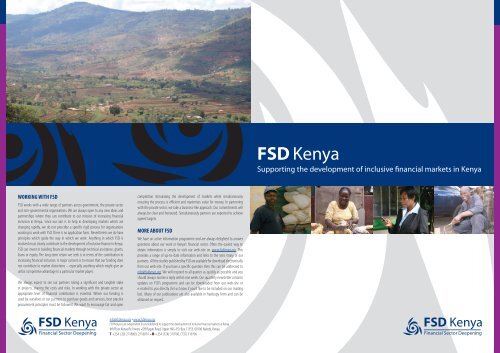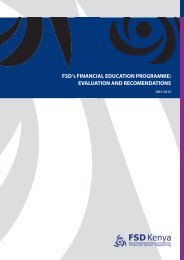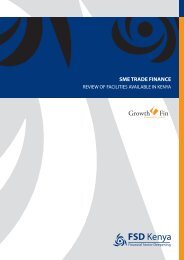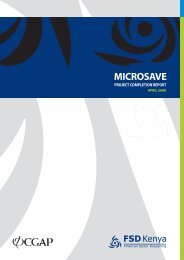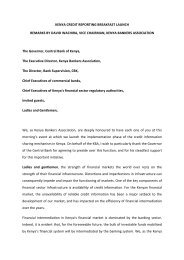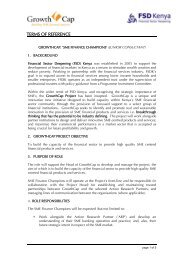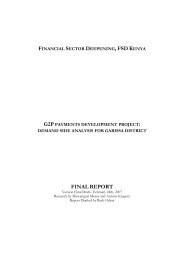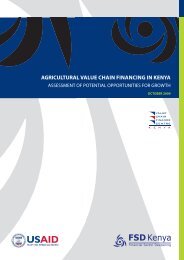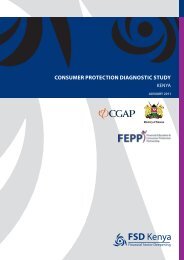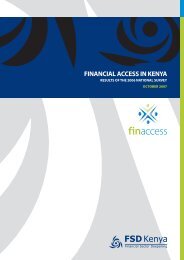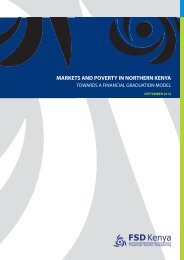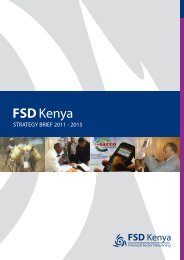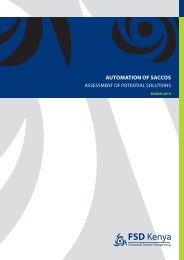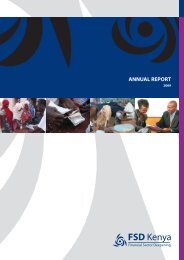FSD Kenya
FSD Kenya
FSD Kenya
Create successful ePaper yourself
Turn your PDF publications into a flip-book with our unique Google optimized e-Paper software.
WORKING WITH <strong>FSD</strong><br />
<strong>FSD</strong> works with a wide range of partners across government, the private sector<br />
and non-governmental organisations. We are always open to any new ideas and<br />
partnerships where they can contribute to our mission of increasing financial<br />
inclusion in <strong>Kenya</strong>. Since our aim is to help in developing markets which are<br />
changing rapidly, we do not prescribe a specific rigid process for organisations<br />
wanting to work with <strong>FSD</strong>. There is no application form. Nevertheless we do have<br />
principles which guide the way in which we work. Anything in which <strong>FSD</strong> is<br />
involved must clearly contribute to the development of inclusive finance in <strong>Kenya</strong>.<br />
<strong>FSD</strong> can invest in building financial markets through technical assistance, grants,<br />
loans or equity. The long-term return we seek is in terms of the contribution to<br />
increasing financial inclusion. A major concern is to ensure that our funding does<br />
not contribute to market distortions – especially anything which might give an<br />
unfair competitive advantage to a particular market player.<br />
We always expect to see our partners taking a significant and tangible stake<br />
in projects, sharing the costs and risks. In working with the private sector an<br />
appropriate level of financial contribution is essential. Where our funding is<br />
used by ourselves or our partners to purchase goods and services, best practice<br />
procurement principles must be followed. We want to encourage fair and open<br />
<strong>FSD</strong> <strong>Kenya</strong><br />
Financial Sector Deepening<br />
competition stimulating the development of markets while simultaneously<br />
ensuring the process is efficient and maximises value for money. In partnering<br />
with the private sector, we take a business-like approach. Our commitments will<br />
always be clear and honoured. Simultaneously partners are expected to achieve<br />
agreed targets.<br />
MORE ABOUT <strong>FSD</strong><br />
We have an active information programme and are always delighted to answer<br />
questions about our work or <strong>Kenya</strong>’s financial sector. Often the easiest way to<br />
obtain information is simply to visit our web-site on www.fsdkenya.org. This<br />
provides a range of up-to-date information and links to the sites many of our<br />
partners. All the studies published by <strong>FSD</strong> are available for download electronically<br />
from our web-site. If you have a specific question then this can be addressed to<br />
info@fsdkenya.org. We will respond to all queries as quickly as possible and you<br />
should always receive a reply within one week. Our quarterly newsletter contains<br />
updates on <strong>FSD</strong>’s programme and can be downloaded from our web-site or<br />
e-mailed to you directly (let us know if you’d like to be included on our mailing<br />
list). Many of our publications are also available in hardcopy form and can be<br />
obtained on request.<br />
info@fsdkenya.org • www.fsdkenya.org<br />
<strong>FSD</strong> <strong>Kenya</strong> is an independent Trust established to support the development of inclusive financial markets in <strong>Kenya</strong><br />
4th Floor <strong>Kenya</strong> Re Towers • Off Ragati Road, Upper Hill • P.O. Box 11353, 00100 Nairobi, <strong>Kenya</strong><br />
T +254 (20) 2718809, 2718814 • M +254 (724) 319706, (735) 319706<br />
<strong>FSD</strong> <strong>Kenya</strong><br />
Supporting the development of inclusive financial markets in <strong>Kenya</strong><br />
<strong>FSD</strong> <strong>Kenya</strong><br />
Financial Sector Deepening
<strong>FSD</strong> <strong>Kenya</strong><br />
FINANCIAL INCLUSION<br />
The importance of the financial system to economic development is well<br />
understood and <strong>Kenya</strong>’s long-term national strategy, Vision 2030, identifies the<br />
sector as one of the country’s core growth pillars. While generally more developed<br />
than others in the region, <strong>Kenya</strong>’s financial sector remains far from achieving its<br />
full potential. Despite considerable progress in the last decade, the financial sector<br />
in <strong>Kenya</strong> has only met a modest fraction of the growing demand from poorer<br />
households and micro, small and medium enterprises.<br />
Credit plays a vital role in supporting productive growth among businesses at<br />
all scales, from large to small, and across all sectors from agriculture to services.<br />
Smaller scale enterprises are of especial importance from the perspective of<br />
poverty reduction given the direct impact of<br />
such businesses – especially in the agricultural<br />
sector – on the livelihoods of poorer people.<br />
However the significance of financial services<br />
goes far beyond credit. It is now firmly<br />
established that secure, high quality savings<br />
rank among the most needed financial services<br />
by poorer households. Savings allow poorer households to manage their finances<br />
in order to deal with routine fluctuations in cash-flows, cope with emergencies<br />
and accumulate for investment in the household or productive opportunities.<br />
In fact the whole spectrum of financial services encompassing credit, savings,<br />
money transfer and insurance can be relevant to the livelihoods of the poor.<br />
New technologies such as Safaricom’s mobile phone based payments service,<br />
M-PESA, promise to revolutionise access to finance in <strong>Kenya</strong>. The Central Bank<br />
of <strong>Kenya</strong> (CBK) is developing the regulatory framework to support these new<br />
approaches. <strong>FSD</strong> is partnering with CBK in this work.<br />
Established in early 2005, <strong>FSD</strong> <strong>Kenya</strong> aims to support the development of inclusive financial<br />
markets in <strong>Kenya</strong> as a means to stimulate wealth creation and reduce poverty. Working in<br />
partnership with the financial services industry our goal is to significantly expand access to<br />
services among lower income households and smaller scale enterprises. <strong>FSD</strong> operates as an<br />
independent Trust under the supervision of professional trustees, with policy guidance from its<br />
programme investment committee. Finance is provided by a number of development partners<br />
including the UK’s Department for International Development (DFID), the World Bank, the<br />
Swedish International Development Agency (SIDA), Agence Francaise de Developpement<br />
(AFD), the Bill and Melinda Gates Foundation together with the Government of <strong>Kenya</strong>.<br />
<strong>FSD</strong> takes a market-based<br />
approach to financial sector<br />
development<br />
<strong>FSD</strong> KENYA’S APPROACH: BUILDING MARKETS<br />
<strong>FSD</strong> takes a market based approach to financial sector development. Evidence from<br />
a diverse range of institutions in <strong>Kenya</strong> clearly shows that financial services can<br />
be provided to low income markets and smaller scale enterprise on a profitable<br />
basis. The essential challenge faced in developing pro-poor finance is in opening<br />
up these markets.<br />
Constraints to market development may exist at a number of levels. At the<br />
broadest level, Government policy, legislation, regulation and supervision sets<br />
the basic framework within which markets operate. An effective framework can<br />
help create viable markets by reducing the costs and risks of doing business.<br />
Looking at the other end of the spectrum, it is retail financial providers – from<br />
investment banks through micro-finance<br />
institutions (MFIs) and savings and credit cooperatives<br />
(SACCOS) to village banks – who<br />
actually deliver services. Developing practical<br />
know-how among financial institutions is at<br />
the heart of market development. Investors are<br />
frequently deterred by the risk of expanding<br />
into unfamiliar markets where they lack experience or relevant technical expertise.<br />
The efficiency and effectiveness of retail providers is often strongly shaped by<br />
the business markets and other support structures in which they are embedded.<br />
These commonly include audit, human resource development or training services,<br />
information technology, credit reference, payments processors, ATM providers,<br />
marketing, research and business consultancy. This forms a middle level, between<br />
the retail and policy levels, which needs to be addressed. Market development<br />
can be enhanced by building capacity and know-how among relevant service<br />
providers and business membership associations.<br />
HOW WE WORK<br />
<strong>FSD</strong>’s primary focus is developing the capacity of the financial services industry,<br />
working directly with a diverse range of financial institutions, business service<br />
providers and support institutions. In doing so, we aim to complement other<br />
initiatives – such as reforms of the enabling environment and wholesale lending<br />
or investments programmes supporting emergent MFIs.<br />
The starting point for <strong>FSD</strong>’s involvement is an analysis of the specific market context<br />
and identification of the underlying constraints. <strong>FSD</strong>’s approach is one of investing<br />
in the development of sustainable financial markets, regardless of how we actually<br />
provide our support. We do not offer subsidies as a ‘quick-fix’ to encourage service<br />
delivery where there is no credible prospect of a market solution emerging. What<br />
we actually offer will depend on what is needed and can range from specialist<br />
know-how to finance.<br />
FOCAL THEMES<br />
To ensure coherence in activity and maximise impact, our work is focused on a<br />
limited number of themes. Reviewed annually, these themes evolve as markets<br />
develop. Priorities change and new opportunities are presented. <strong>FSD</strong> currently has<br />
three themes:<br />
Core financial system<br />
Developing basic financial services delivery capacity remains at the heart of<br />
achieving our goal of making financial markets work for the poor. Efficient and<br />
sustainable capacity in the financial services industry provides the essential basis<br />
for delivering services to lower income consumers or smaller scale enterprise,<br />
whether directly or indirectly. Much of the work in this theme also directly<br />
underpins our second theme area on rural finance. Considerable progress has<br />
been made in recent years with the rapid growth of a number of MFIs and banks<br />
addressing consumers towards the ‘bottom of the pyramid’. With the success of<br />
these institutions, our current strategy is shifting from an earlier emphasis on direct<br />
support for industry players to addressing the needs of this emergent industry<br />
as a whole. Developing support for training and skills development needed by<br />
low-income oriented financial institutions exemplifies this type of industry-wide<br />
work.<br />
Rural finance<br />
Data from the FinAccess 2009 study found that <strong>Kenya</strong>ns<br />
in rural areas are less than half as likely to use banking<br />
services by comparison with those in the urban centres.<br />
Furthermore with around four out of every five <strong>Kenya</strong>ns<br />
involved directly or indirectly in the agricultural sector,<br />
agricultural finance is clearly a major priority within the<br />
rural context. Much will be achieved by working with the<br />
financial sector in developing new products appropriate to the needs of rural areas<br />
and delivering them through new lower cost channels. Innovative approaches to<br />
managing risk – such as new weather insurance techniques – can help credit<br />
providers address the particular characteristics of risk in rural areas.<br />
Community based financial organisations can provide services to lowincome<br />
people in more remote rural areas far beyond the current reach of<br />
formal banks. <strong>FSD</strong> is engaged in a number of initiatives to strengthen and<br />
expand community based financial groups.<br />
<strong>FSD</strong>’s work is<br />
currently focused on<br />
three major themes<br />
Delivering social protection payments through the financial system can help<br />
bring new services to whole communities. <strong>FSD</strong> is promoting the development<br />
of payments solutions through the financial sector.<br />
Nevertheless many very poor households and micro enterprises in rural areas are<br />
likely to remain beyond the reach of the formal financial sector for many years.<br />
Community based finance can offer a much lower cost<br />
way to provide basic services, especially in areas far<br />
beyond major centres. Experience shows however that<br />
there are challenges faced in governance and technical<br />
capacity. These can lead to high rates of organisational<br />
failure in community based financial organisations<br />
resulting in losses to their members. In the more<br />
sophisticated models, low-cost, appropriate training,<br />
support and supervision can mitigate these problems. <strong>FSD</strong> is also supporting the<br />
use of highly simplified group savings and loan association models which can<br />
easily be operated by members without any prior knowledge of finance.<br />
Finance for growth<br />
Across the world, broad based economic growth has been strongly linked with the<br />
development of the small and medium enterprise sector. Few financial institutions<br />
address this market effectively. The products and underlying risk management<br />
techniques of mainstream commercial banks fail to ‘scale-down’ to reach many<br />
small and medium enterprises (SMEs) while those of micro-finance institutions<br />
typically don’t ‘scale-up’. Successful products for this market can borrow techniques<br />
from both, but a more nuanced approach is needed which addresses the distinctive<br />
credit management challenges posed by SMEs.<br />
International experience shows that techniques can be developed which allow<br />
SME lending to be undertaken profitably in a developing economy context. <strong>FSD</strong><br />
has been working directly with pioneering institutions seeking to build SME<br />
finance capability. More recently we have started to a work at a broader level,<br />
supporting the implementation of credit reference in <strong>Kenya</strong> which can significantly<br />
reduce costs of SME credit analysis, improving access.<br />
<strong>FSD</strong> <strong>Kenya</strong><br />
Financial Sector Deepening


